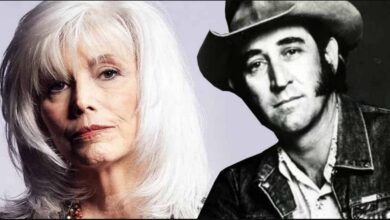Freddy Wrote This Song In 1956, And It Finally Became A Hit In The 70s. Way To Go, Freddy!
Freddy Fender, born Baldemar Garza Huerta in 1937, was an influential figure in American music, particularly within the realms of Tejano, country, and rock and roll. His roots lay in a family of Mexican descent, with his early life spent in the heart of Texas. Even from a young age, Fender was immersed in music, captivated by the sounds that surrounded him. He began performing in local venues and honed his craft while working various jobs to support himself and his family. His distinctive voice and heartfelt delivery would soon set him apart in the music industry.
In 1959, Fender recorded “Wasted Days and Wasted Nights,” a poignant ballad that reflected the struggles and heartaches he experienced. The song, although it did not achieve immediate success, showcased his unique blend of genres that would later define his musical career. Unfortunately, Fender’s rise to fame was hampered by legal troubles; a conviction for marijuana possession led to a stint in prison. This period was challenging for Fender, but he maintained his connection to music, using it as an outlet for the emotions and experiences of his life.
Upon his release, the early 1970s brought a renewed sense of determination. Fender’s breakthrough came in 1974 with “Before the Next Teardrop Falls,” which resonated deeply with audiences. The single’s success was not only significant for Fender personally; it also highlighted the growing acceptance of Tejano and Mexican-American music within the broader country music category. This marked a pivotal moment in his career and proved that his artistry could transcend borders and genres.
Following the success of “Before the Next Teardrop Falls,” Fender revisited his earlier work, including “Wasted Days and Wasted Nights.” The revamped version in 1975 revitalized interest in the song, propelling it up the charts. Fender’s emotive delivery and the melding of country with Tejano rhythms intrigued both old and new fans, reaffirming his diverse musical talent. He became a symbol of cultural fusion, bridging the gap between different musical traditions.
Fender’s career flourished throughout the 1970s and 1980s, marked by a string of successful albums and hit singles. His music often reflected themes of love, loss, and the experiences of the Hispanic community, contributing to a more inclusive narrative within the music scene. His ability to connect with listeners through relatable storytelling made him a beloved figure among fans. He embraced his heritage, and this authenticity resonated profoundly with those who appreciated music that spoke to their own experiences.
Over the decades, Fender evolved as an artist while maintaining his core style. He collaborated with various musicians and bands, consistently exploring new creative avenues. Through this, he helped to popularize Tejano music outside its traditional borders, paving the way for future artists in the genre. His influence extended far beyond his own recordings; many artists cited Fender as a major inspiration, demonstrating his impact on the next generation of musicians.
Recognizing his contributions, Fender received numerous accolades throughout his career. The Texas Country Music Hall of Fame honored him posthumously in 2002, ensuring that his legacy would be remembered in the annals of music history. His contributions to the genre helped to shape the identity of country music during a significant era of change and celebrated the rich cultural tapestry of America.
Despite his passing on October 14, 2006, the music of Freddy Fender continues to resonate with audiences worldwide. Classic tracks like “Wasted Days and Wasted Nights” and “Before the Next Teardrop Falls” remain staples on various playlists, a testament to their enduring appeal. Fender’s story is not just one of success; it embodies the spirit of resilience, illustrating how passion and perseverance can triumph over adversity.
Fender’s life and career serve as powerful reminders of the struggles faced by many artists. Through moments of hardship and triumph, he transformed his experiences into poignant music that touched hearts and changed lives. His legacy is a celebration of the power of music to bring people together, transcend cultural barriers, and tell stories that resonate across generations. As time goes on, Freddy Fender’s contributions to music and culture will be cherished, reflecting the essence of his artistic journey and the joy he brought to many through song.
&ab_channel=MariolaLubera





